The Ultimate Guide on Corn Flakes Manufacturing Plant in 2024
Introduction
Welcome to the ultimate guide on setting up and operating a corn flakes manufacturing plant in 2024. As demand for nutritious breakfast options continues to rise globally, understanding the intricacies of corn flakes production is crucial for industry professionals. This guide will delve into the foundational aspects of establishing a successful corn flakes manufacturing plant, covering everything from initial planning and equipment selection to quality control and future trends. Whether you're a seasoned entrepreneur or a newcomer to the food processing industry, this comprehensive resource will equip you with essential knowledge to navigate the competitive landscape of cereal production.
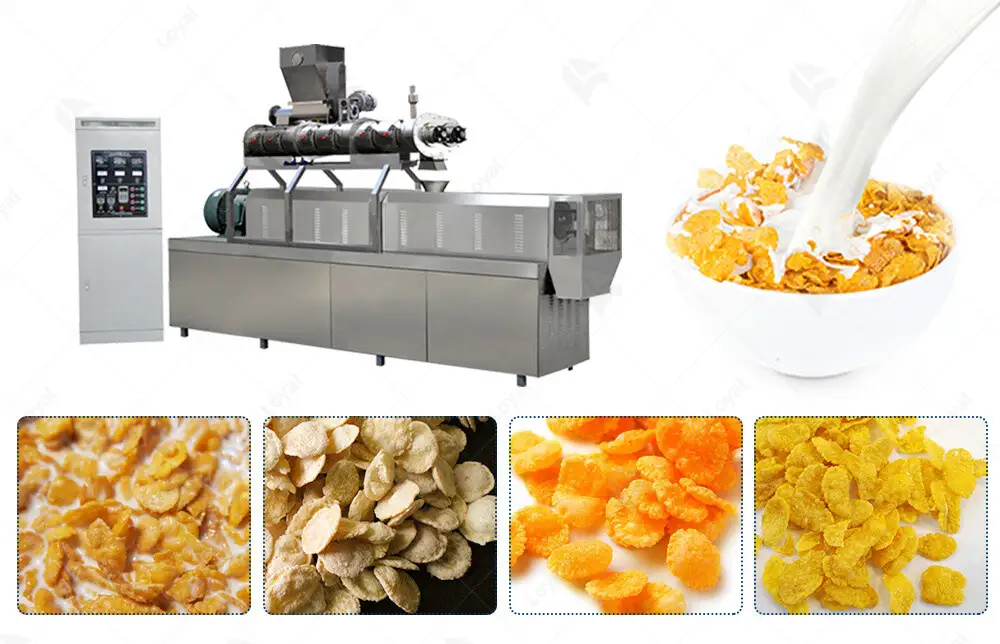
Equipment in Corn Flakes Manufacturing Plant
Essential Machinery and Equipment
Setting up a successful corn flakes manufacturing plant in 2024 requires a keen understanding of the essential machinery and equipment. This equipment ensures efficiency, consistency, and high-quality production. Here's a breakdown of the critical machines you'll need:
Corn Preparation Equipment
Corn preparation is the first crucial step in the corn flakes manufacturing process. The following equipment is essential:
1. Corn Cleaners: These machines remove impurities such as dust, stones, and husks from the raw corn. High-efficiency cleaners are necessary to ensure that only the best quality corn proceeds to the next stage.
2. Conditioning Machines: These devices adjust the moisture content of the corn to the optimal level for processing. Proper conditioning ensures that the corn is neither too dry nor too moist, which is critical for producing high-quality flakes.
Flaking Machines
The flaking machine is at the heart of any corn flakes manufacturing plant. It converts cooked corn into thin, uniform flakes. Key features of an efficient flaking machine include:
1. Roller Mills: These mills crush the cooked corn into thin flakes. The precision and quality of the rollers determine the consistency and texture of the final product.
2. Temperature Control Systems: Maintaining the correct temperature during the flaking process is essential. Advanced temperature control systems ensure that the corn flakes are cooked evenly, resulting in a uniform product.
Drying and Toasting Equipment
Drying and toasting are critical to achieving the desired crunch and shelf life of corn flakes. The primary equipment includes:
1. Dryers: These machines remove excess moisture from the flakes. Modern dryers use advanced technologies to ensure energy efficiency and uniform drying.
2. Toasters: Toasters give corn flakes their characteristic crunch and golden color. High-quality toasting equipment allows for precise control over toasting time and temperature, ensuring a perfect finish.
Packaging Machines
Efficient packaging is vital for maintaining the freshness and quality of corn flakes. Essential packaging machinery includes:
1. Filling Machines: These machines accurately measure and fill corn flakes into packages. Precision is key to avoid overfilling or underfilling, which can impact product consistency and customer satisfaction.
2. Sealing Machines: These machines ensure airtight sealing of the packages, preserving the crunchiness and flavor of the corn flakes.
By investing in the right machinery and equipment, your corn flakes manufacturing plant can achieve high efficiency, product quality, and customer satisfaction. Advanced, well-maintained equipment forms the backbone of a successful production line, ensuring you stay competitive in the market.

Technological Advancements in 2024
In 2024, the corn flakes manufacturing plant industry is witnessing significant technological advancements that are transforming production efficiency and product quality. These innovations are essential for staying competitive and meeting the evolving demands of consumers.
Automation and Efficiency Improvements
Automation is a key advancement in the modern corn flakes manufacturing plant. Automated systems streamline various stages of production, from raw material handling to packaging. These systems not only reduce human error but also enhance consistency and speed. For instance, automated cooking and flaking machines ensure precise temperature and timing controls, resulting in a more uniform product.
Energy-Saving Technologies
Energy efficiency is a major focus in 2024, driven by both environmental concerns and cost savings. New energy-saving technologies are being integrated into corn flakes manufacturing plants to reduce energy consumption. Innovations such as heat recovery systems and advanced drying technologies help minimize energy use without compromising product quality. This not only lowers operational costs but also supports sustainability goals.
Smart Manufacturing
The integration of smart manufacturing technologies, including IoT (Internet of Things) and AI (Artificial Intelligence), is revolutionizing the corn flakes manufacturing plant landscape. These technologies provide real-time monitoring and data analysis, allowing for predictive maintenance and immediate response to production issues. For example, sensors embedded in machinery can detect anomalies and trigger alerts before a breakdown occurs, ensuring continuous and efficient operation.
Advanced Packaging Solutions
In 2024, advancements in packaging technology are also noteworthy. Modern corn flakes manufacturing plants are adopting innovative packaging solutions that extend shelf life and maintain product freshness. Vacuum sealing, modified atmosphere packaging, and eco-friendly materials are some of the trends enhancing the packaging process. These solutions not only improve product quality but also align with consumer preferences for sustainable and convenient packaging.
The technological advancements in 2024 are setting new standards for efficiency, sustainability, and quality in the corn flakes manufacturing plant industry. By embracing automation, energy-saving technologies, smart manufacturing, and advanced packaging solutions, manufacturers can ensure they remain competitive and meet the high expectations of today's consumers.

Maintenance and Upkeep
Regular Maintenance Schedules
To ensure the optimal performance of your corn flakes manufacturing plant, establishing a regular maintenance schedule is essential. Routine inspections and servicing can prevent unexpected breakdowns and extend the lifespan of your machinery. Key maintenance tasks include:
- Daily Checks: Inspect critical components such as flaking machines, drying equipment, and conveyor belts for any signs of wear or damage. Ensure all moving parts are well-lubricated to prevent friction and overheating.
- Weekly Maintenance: Clean all machinery thoroughly to avoid buildup of residue that could affect the quality of the corn flakes. Check calibration of equipment to ensure consistency in production.
- Monthly Servicing: Conduct more in-depth inspections of electrical systems, safety mechanisms, and control panels. Replace any worn-out parts and update software for automated systems to maintain efficiency and safety standards.
Troubleshooting Common Issues
Even with a robust maintenance schedule, issues can occasionally arise in a corn flakes manufacturing plant. Being prepared with troubleshooting strategies can minimize downtime and keep production running smoothly. Common issues and their solutions include:
- Inconsistent Flake Size: If you notice variations in the size of the corn flakes, check the flaking machine’s rollers for even pressure distribution. Adjust settings as necessary to achieve uniform thickness.
- Machine Overheating: Overheating can be a sign of insufficient lubrication or a malfunctioning cooling system. Ensure all lubricants are at appropriate levels and clean cooling vents regularly to prevent blockages.
- Electrical Failures: Regularly inspect wiring and electrical connections for any signs of wear or corrosion. Replace faulty components immediately to avoid electrical hazards and ensure uninterrupted power supply.
Importance of Preventive Maintenance
Preventive maintenance is crucial in a corn flakes manufacturing plant to avoid costly repairs and downtime. By anticipating potential problems and addressing them proactively, you can ensure that your production line operates efficiently and effectively. Benefits of preventive maintenance include:
- Increased Longevity of Equipment: Regular maintenance helps to identify and fix minor issues before they escalate, prolonging the life of your machinery.
- Enhanced Product Quality: Consistent maintenance ensures that all equipment operates at peak performance, resulting in high-quality corn flakes that meet industry standards.
- Cost Savings: Investing in preventive maintenance can reduce the likelihood of major breakdowns, saving you money on emergency repairs and lost production time.
Implementing a comprehensive maintenance and upkeep plan is a vital aspect of managing a successful corn flakes manufacturing plant. By maintaining your equipment regularly, troubleshooting issues promptly, and focusing on preventive care, you can ensure the smooth and efficient operation of your production line in 2024 and beyond.
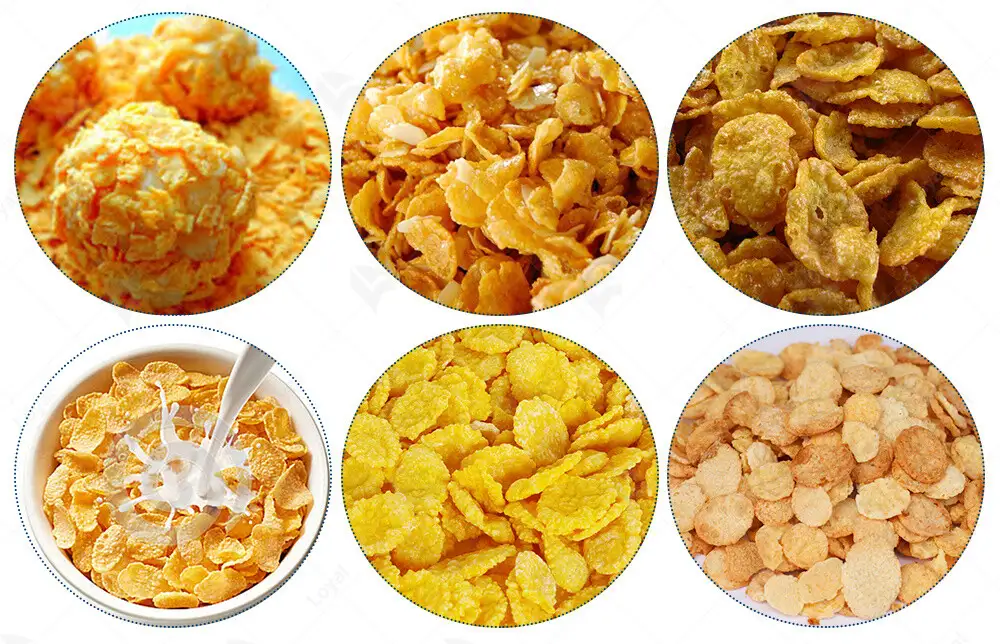
The Manufacturing Process of Corn Flakes
Raw Material Selection and Preparation
The journey of creating high-quality corn flakes begins with selecting the best raw materials. For a successful corn flakes manufacturing plant, choosing premium-grade corn is crucial. The corn should be free from contaminants and impurities to ensure the final product's quality and safety.
Once the corn is sourced, it undergoes a thorough cleaning and conditioning process. Cleaning involves removing any dirt, stones, and foreign materials. This step is vital to prevent any contamination that could affect the product's quality or the machinery's performance.
Conditioning involves adjusting the moisture content of the corn. Proper moisture levels are essential for the subsequent steps in the manufacturing process. This step ensures the corn is adequately prepared for cooking and flaking, setting the stage for producing perfect corn flakes.
Cooking and Flaking Process
The heart of the corn flakes manufacturing process lies in cooking and flaking the corn. The cleaned and conditioned corn is first cooked to soften the kernels. This is achieved through a combination of steam and pressure in large cooking vats. The cooking process breaks down the starches in the corn, making them more digestible and giving the corn its unique texture.
After cooking, the corn is ready for flaking. The cooked corn kernels are passed through large rollers that flatten them into thin flakes. The thickness and texture of the flakes can be adjusted by modifying the roller settings, ensuring consistency in the final product.
Drying and Toasting
Once the corn has been flaked, it needs to be dried to remove excess moisture. This step is crucial to achieve the desired crunchiness in the final product. The drying process involves passing the flakes through hot air dryers, which evaporate the moisture while preserving the flakes' texture.
Toasting follows drying, where the flakes are exposed to high temperatures to achieve their golden color and crispy texture. This step enhances the flavor and shelf life of the corn flakes, making them ready for consumption.
Packaging and Distribution
The final step in the corn flakes manufacturing process is packaging. The dried and toasted flakes are carefully weighed and packaged in airtight containers to maintain freshness. The packaging process in a corn flakes manufacturing plant is automated to ensure efficiency and hygiene.
Proper packaging not only preserves the product's quality but also makes it convenient for distribution. The packaged corn flakes are then ready to be shipped to retailers and consumers, completing the journey from raw corn to a breakfast staple.
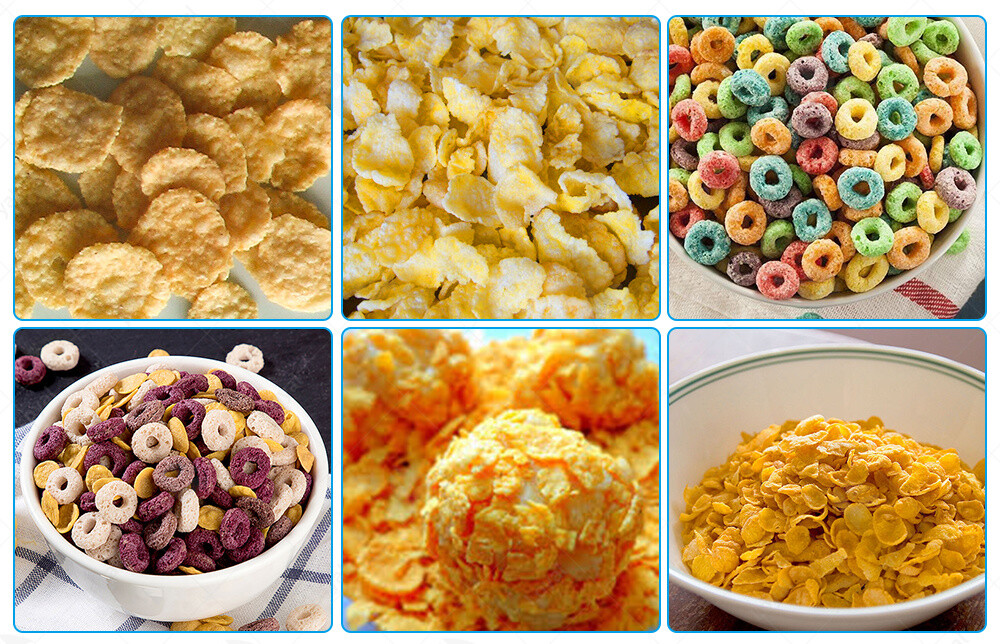
Quality Control and Safety Measures in Corn Flakes Manufacturing Plant
Implementing Quality Control Systems
Ensuring the production of high-quality corn flakes is essential for the success of any corn flakes manufacturing plant. Implementing robust quality control systems is crucial. This involves adhering to industry standards and obtaining necessary certifications. Regular monitoring and testing are integral parts of maintaining product quality.
Standards and Certifications
To meet consumer expectations and regulatory requirements, a corn flakes manufacturing plant must comply with various standards such as ISO 22000 for food safety management. These certifications not only enhance the credibility of the manufacturing plant but also ensure that the production processes are up to mark.
Continuous Monitoring and Testing
Quality control in a corn flakes manufacturing plant involves continuous monitoring at every stage of production. From raw material inspection to the final packaging, each step must be scrutinized. Regular testing of the corn flakes for factors such as moisture content, flake size, and taste consistency helps in maintaining the desired product quality.
Ensuring Safety in Production
Worker safety and hygiene are paramount in a corn flakes manufacturing plant. Implementing strict safety protocols protects workers from potential hazards and ensures a safe working environment.
Worker Safety Protocols
Safety protocols should include proper training for workers on handling machinery and equipment. The use of personal protective equipment (PPE) and regular safety drills are essential practices. Additionally, maintaining clear safety signage and emergency exits in the plant enhances overall safety.
Hygiene and Cleanliness in the Plant
Maintaining a clean and hygienic environment in the corn flakes manufacturing plant is critical to prevent contamination. Regular cleaning schedules, proper waste disposal systems, and ensuring that workers follow hygiene practices, such as wearing gloves and hairnets, are necessary measures.
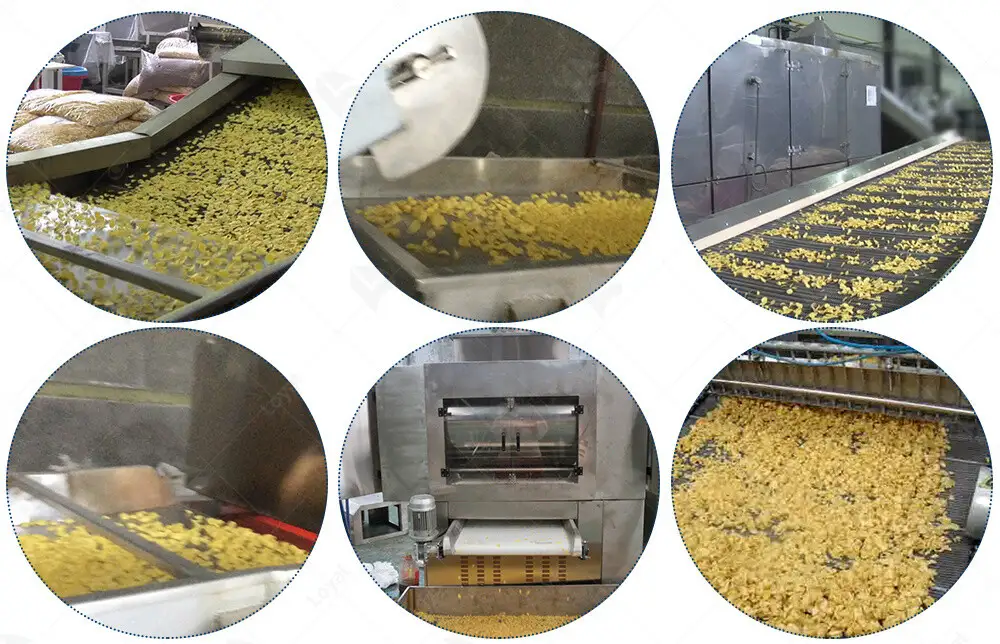
Future Trends and Innovations in Corn Flakes Manufacturing
Emerging Trends in 2024
In 2024, the corn flakes manufacturing plant landscape is evolving with several emerging trends. One significant trend is the shift towards healthier options. Consumers are increasingly seeking corn flakes that are low in sugar, high in fiber, and fortified with vitamins and minerals. This demand is driving manufacturers to innovate and reformulate their products to meet these health-conscious preferences.
Another notable trend is the focus on sustainability. Corn flakes manufacturing plants are adopting eco-friendly practices to reduce their environmental impact. This includes using renewable energy sources, optimizing water usage, and implementing waste reduction strategies. Sustainable packaging solutions, such as biodegradable and recyclable materials, are also becoming more prevalent in the industry.
Innovations in Manufacturing Processes
Technological advancements are revolutionizing the corn flakes manufacturing plant operations. Automation and smart manufacturing technologies are streamlining production processes, enhancing efficiency, and reducing labor costs. These innovations include the use of robotics for handling and packaging, as well as advanced sensors and data analytics for real-time monitoring and quality control.
Additionally, energy-efficient machinery is gaining traction in the industry. Modern corn flakes manufacturing plants are investing in equipment that consumes less energy while maintaining high production standards. This not only lowers operational costs but also aligns with the industry's sustainability goals.
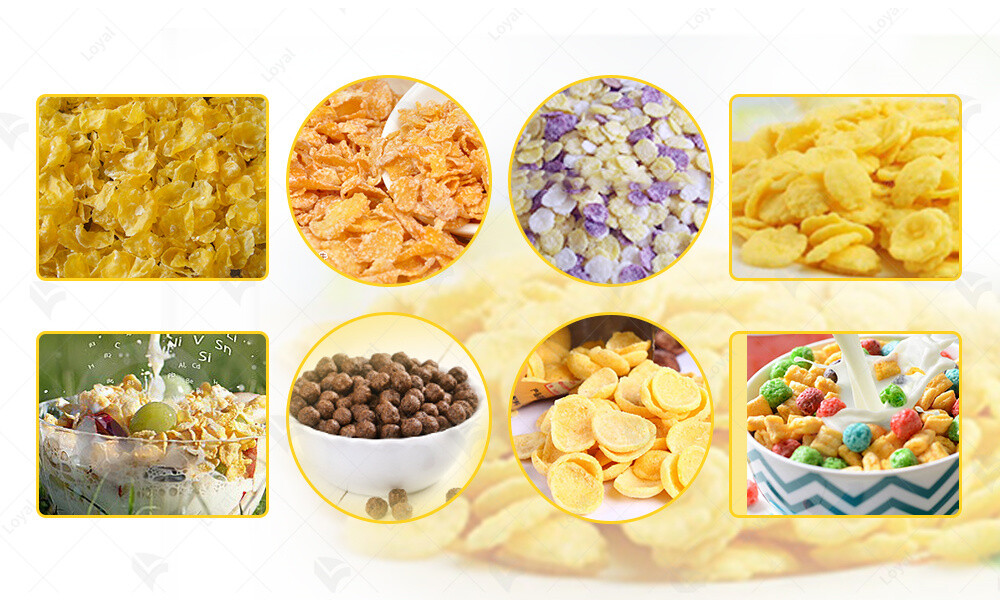
Reference
The following are five authoritative foreign literature websites in the field of Industrial food machinery:
1. Food Engineering Magazine
Website: https://www.foodengineeringmag.com/
2.Food Processing Magazine
Website: https://www.foodprocessing.com/
3.Journal of Food Engineering
Website:https://www.journals.elsevier.com/journal-of-food-engineering
4. Food Manufacturing Magazine
Website:https://www.foodmanufacturing.com/
5. International Journal of Food Science & Technology
Website:https://onlinelibrary.wiley.com/












